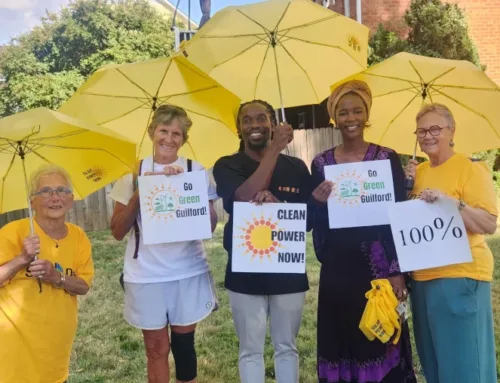How illegal cannabis dispensaries thrive in SoCal
November 3, 2025
LOS ANGELES — When Andy Pang rented out a retail space in his Hacienda Heights strip mall, he thought his new tenant was opening a clothing store.
“We believe[d] him because he filled out the application form and after the credit check, everything [was] fine,” Pang said.
What You Need To Know
A Spectrum News investigation uncovered an apparent network of at least 20 unlicensed cannabis dispensaries operating across Southern California
Landlords said the prospective tenant would claim they’re opening a clothing store before opening a dispensary
Sometimes, the dispensaries stopped paying rent and refused to leave even after eviction proceedings started
Some of the dispensaries were allegedly opened by companies formed using stolen identities
But shortly after getting access to the unit in May, Pang said his new tenant changed the locks and started distributing flyers for his new unlicensed cannabis dispensary, offering opening specials of five grams for free with a minimum purchase, according to public records.
“We talked to him, asked him to move away immediately because he breached the lease,” Pang said.
Pang, who is in his 70s and battling health issues, explained how when that didn’t work, he started eviction proceedings against the dispensary, which are still pending. Meanwhile, it remains open in a shopping center that includes a church, a nail salon and medical offices.
A Spectrum News investigation found that dispensary is linked to a vast network of other illegal stores. We reviewed dozens of eviction lawsuits and public business records that show the man who rented from Pang and companies linked to him have opened at least 20 unlicensed cannabis dispensaries throughout California since 2023 — and since many eviction cases are sealed, the true number is likely higher.
And while law enforcement and government lawyers will target individual dispensaries for enforcement, fewer resources go into unmasking the people operating them — especially when they hide behind multiple aliases and companies to run a large-scale operation.
For this investigation, Spectrum News reviewed aliases listed as officers for multiple companies that leased retail spaces for unlicensed dispensaries. We discovered at least one of those aliases is a stolen identity.
Spectrum News reviewed two identification cards featuring names used in lease applications on multiple dispensaries in our investigation.
A police source said both cards were likely fake — including one that was used to rent Pang’s property. That same name is listed as CEO of Redwood Group 12, Inc. and Abner Group, Inc., and both companies list the same multi-unit Fullerton office building as their principal address, without giving a suite number.
Redwood Group 12 leased seven of the more than 20 locations we reviewed, and Abner Group rented another four.
Other locations were leased by companies including Crosshaven Investments and Gold Crest Associates, who used the same Fullerton building as their principal address.
Spectrum News has not yet confirmed the dispensary operator’s true identity. Messages to email addresses he used on rental applications went unanswered, and his attorney did not respond to our request for comment.
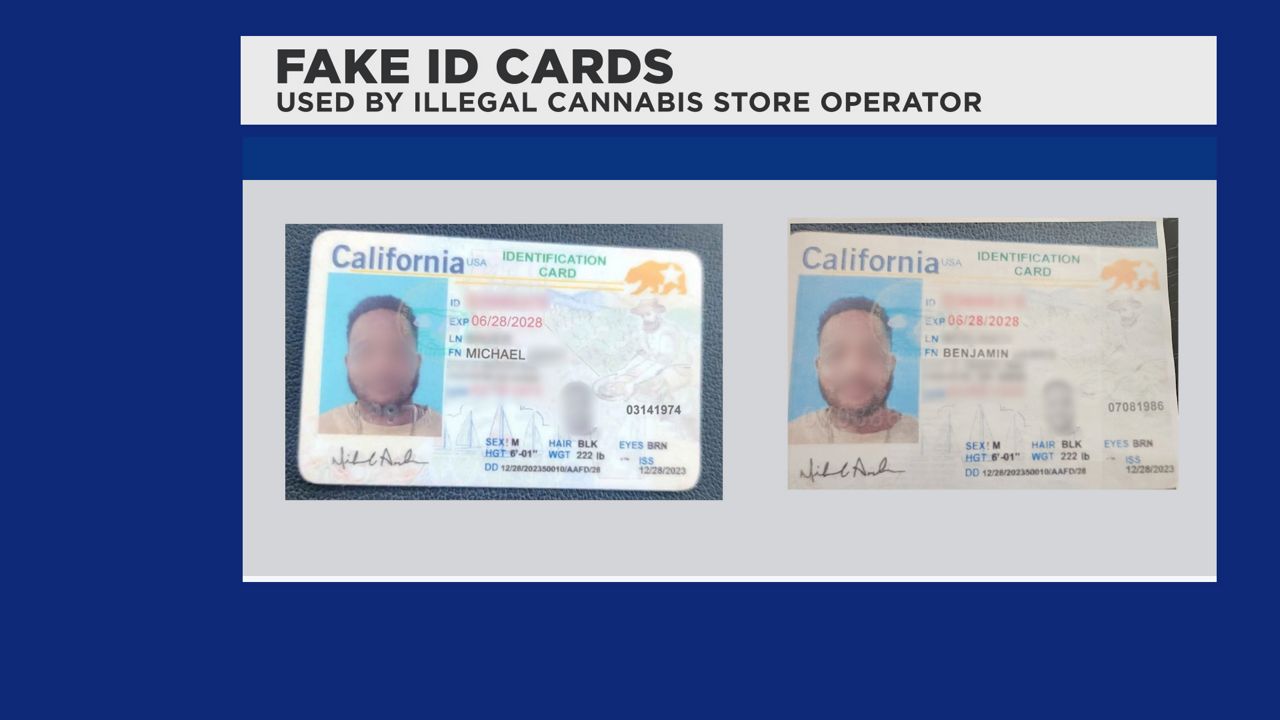
Spectrum News reviewed two identification cards that featured names used in leases for unlicensed cannabis dispensary locations. Both cards featured the same photo, and a police source said the cards are likely fake.
A prevalent problem
Illegal cannabis dispensaries can be lucrative, which is why they’re so prevalent across Southern California. A 2024 Pew Research Center study found there were 1,481 dispensaries in Los Angeles County, more than any other state besides California, but a report published this year from ERA Economics found only 528 are licensed in the region.
Licensed dispensaries are required to sell tested products, pay taxes and licensing fees and track their supply chains. Products at unlicensed stores can pose a health risk to consumers, according to experts.
Law enforcement officials who work in drug enforcement told Spectrum News that while it’s common for people to operate more than one dispensary, the number of connected stores found in our investigation is higher than what they’ve seen.
The stores that are a part of our investigation open using a similar playbook. The prospective tenant tells landlords he’ll open a clothing store, usually Rawyalty Clothing, but then quickly sets up a dispensary once he gets the keys. Landlords have filed eviction lawsuits against them in LA, Orange and Kern counties.
Spectrum News reached out to email addresses listed on Rawyalty Clothing’s website but didn’t get a response. Rawyalty was listed as the “doing business as” name of Redwood Group 12 in a Covina eviction lawsuit.
In July, a fire inspector visited a South-Central LA dispensary leased by Redwood Group 12. That inspection report noted extensive renovations that posed a fire hazard, including holes cut in walls to run extension cords between rooms, new interior rooms constructed and plywood covering windows.
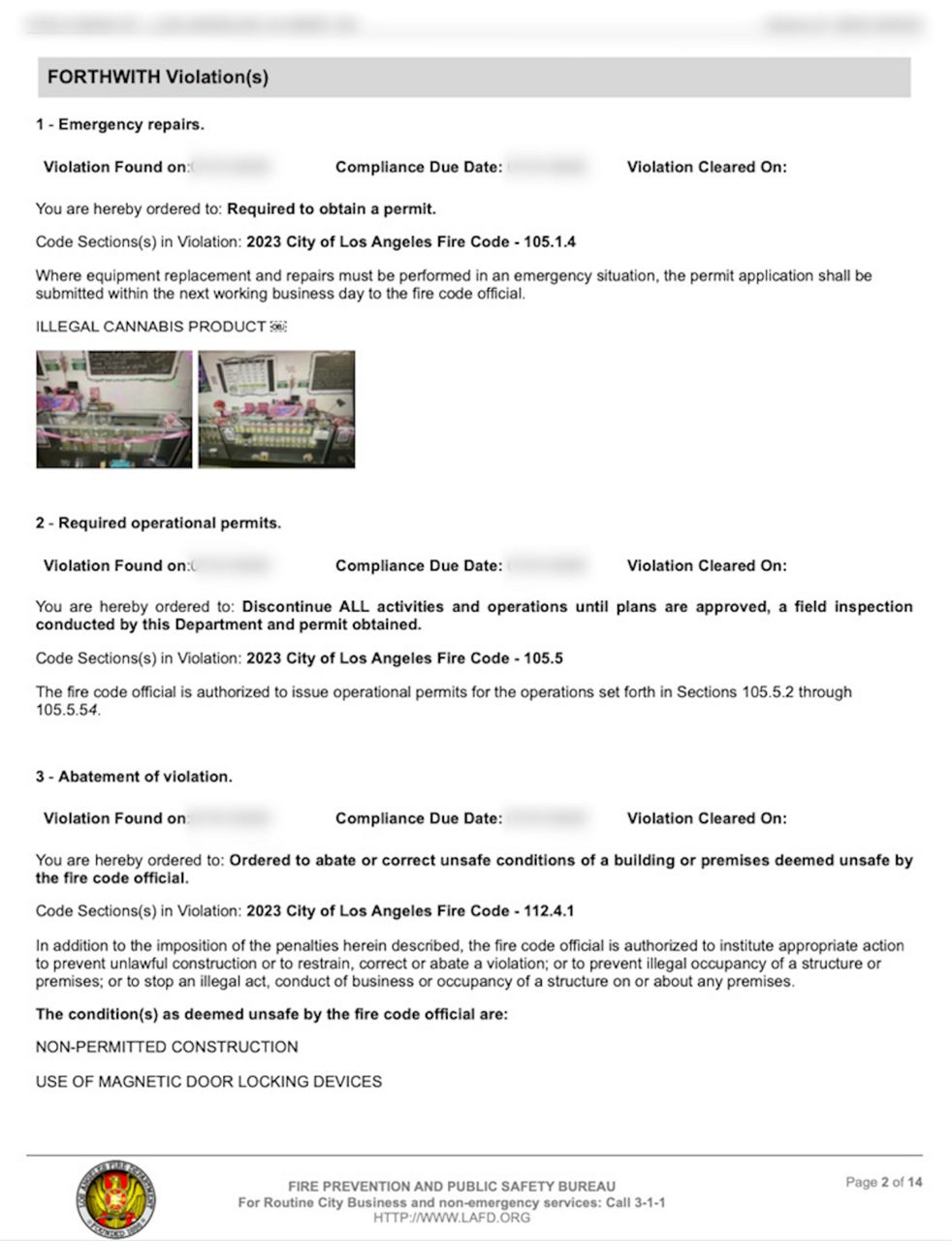
An inspection of a South-Central Los Angeles dispensary in July, 2025 found multiple code violations. The illegal dispensary was leased by Redwood Group 12, Inc., a company that leased several retail locations used for unlicensed dispensaries found in Spectrum News’ investigation. (Los Angeles Fire Department)
According to the lawsuit Pang filed, the tenant dismantled a shower and laundry room in the unit.
Some of the eviction lawsuits reviewed by Spectrum News claimed the tenant stopped paying rent shortly after moving in, and attorneys Spectrum News spoke to said landlords typically can’t accept payments once eviction proceedings start, meaning the shops were able to operate rent-free.
A search by Spectrum News did not find a single licensed dispensary associated with the aliases or companies we investigated. Spectrum News spoke to multiple attorneys who have represented landlords in cases against the aliases and companies in our investigation.
These attorneys said the shops are able to continue operating because of adept legal tactics by their lawyer, Anthony Sears.
Sears will generally prolong eviction cases by filing challenges, known as demurrers, and keeps his clients’ identities a secret, according to attorneys who spoke to Spectrum News. A search of his cases over the past five years shows he regularly represents cannabis dispensaries facing eviction.
Sears is representing the dispensary Pang is trying to evict, along with 13 others connected to the companies in our investigation.
He said “no comment” in an email after Spectrum News reached out to him.
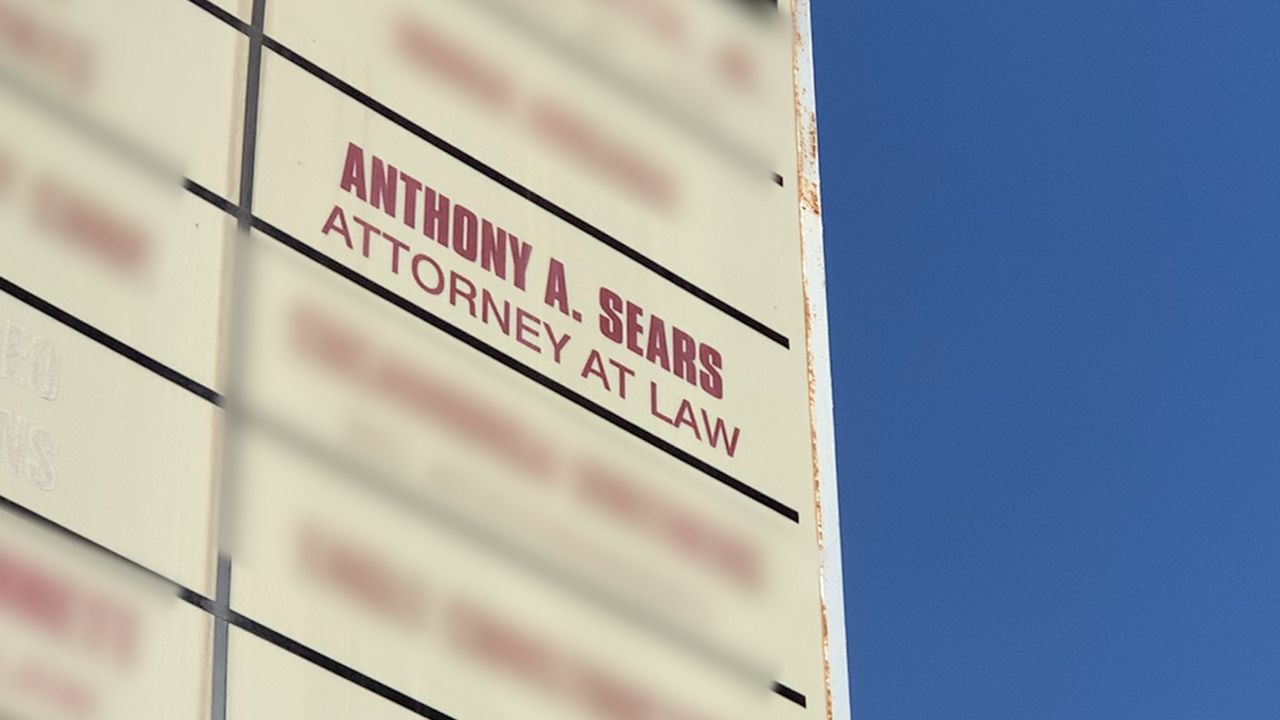
A sign outside of Anthony Sears’ Upland office advertises his business. (Spectrum News/Cory Minderhout)
Another challenge for landlords is the final step in the eviction process, when a judge orders sheriff’s deputies to lock out the tenant. Because of the high volume of requests, this can take months after the judge has signed off, according to multiple eviction attorneys who spoke to Spectrum News.
A public records request to the LA County Sheriff’s Department shows a jump in the number of lockouts carried out by deputies over the past two years, potentially due to expiring COVID-19 eviction protections.
Deputies completed 7,580 lockouts in 2022, then 13,276 in 2023 and 12,981 in 2024. So far this year, they’ve carried out 7,730.
Regulating the industry
Although dispensaries have become commonplace in Southern California after voters legalized recreational cannabis use in 2016, regulating the marketplace has been challenging for state and local authorities.
In September, Gov. Gavin Newsom signed a bill eliminating a 25% tax increase on legal products to “ensure the long-term success of the legal cannabis market.”
Assemblymember Matt Haney, D-San Francisco, who authored the bill, said in a news release that the state’s legal cannabis industry is “dying” as it tries to compete with the illegal market
Last year, Californians consumed 2.4 million pounds of cannabis from unregulated sources, about 60% of the total market, according to a report by ERA Economics.
Data from the state Department of Tax and Fee Administration, first reported by the San Francisco Chronicle, also shows taxable sales of cannabis have fallen 30% since 2021.
It took two years to secure the proper permits before opening Swish Cannabis, a legal dispensary in North Hollywood, according to its owner and operator Yoni Shomer.
“It takes a very long time to get through everything because it is all brand new,” Shomer said. “So, it’s really hard to get good, concrete information because we are at the forefront of it, and nobody is really guiding you to tell you exactly step-by-step what to do.”
He told Spectrum News there are two illegal dispensaries operating within blocks of his store, and it’s tough to compete when his combined state and local taxes are close to 40%.
“[It] takes a lot of time, money, effort, branding, all that fun stuff to know that we are selling a good healthy product that is okay to consume,” Shomer said. “Where they are selling a product where maybe you don’t know where it is coming from, and they are also selling it for much cheaper.”
He added that his business relies on discerning consumers who go to licensed dispensaries because of the sourcing and testing requirements on the products. But Shomer said it’s frustrating when he sees the proliferation of unlicensed stores in the city.
“We have probably more or the same amount of illicit stores in our area than we do have legal stores,” he said. “And there are a ton of legal stores that we all have to compete with on that even playing field.”
Chipping away at black market
State agencies have focused on enforcing cannabis laws by confiscating plants from illegal grow sites and the final products at unlicensed dispensaries. The California Department of Fish and Wildlife said they removed 21,000 marijuana plants from illegal grow sites near watersheds this summer — noting that unregulated grow sites commonly use pesticides that can run off into waterways. A Los Angeles Times investigation last year found pesticide levels above what’s allowed by the state in a majority of the cannabis products they tested.
The California Department of Cannabis Control has carried out 25 raids on unlicensed dispensaries over the past three months–netting 96,000 pounds of cannabis, which includes items such as edibles and vape cartridges, worth nearly half a billion dollars, according to the department.
A department spokesperson said they value processed cannabis flower at $1,650 per pound, cannabis concentrates at $7,600 per pound and vape pens at $800 per pound.
On a rainy Tuesday morning, Spectrum News followed along as its officers lined up in front of a North Hollywood storefront.
A budtender and security guard fled out the back but were quickly detained by officers waiting in the alley. Officers confiscated and bagged nearly 102 pounds of various cannabis products worth about $190,000, about 10 pounds of psilocybin mushrooms and $7,603 in cash.
Video taken inside the store shortly after the raid showed jars of cannabis with various labels including “banana OG,” “mojito” and “house shake.” A spin wheel in the corner offers prizes like a free grinder or lighter and display cases are lined with prepackaged cannabis concentrates, including several advertised by the title character of the “Rick and Morty” TV show.
Sgt. Humberto Irigoyen, who led the North Hollywood raid, said they’ve served a search warrant at the location twice before, along with another dispensary across the street. Stores will usually keep just enough product in stock to last through the day knowing they run the risk of being raided, he said.
His team’s goal is to become a nuisance to unlicensed dispensaries, Irigoyen said, adding they once served 15 search warrants at a Woodland Hills dispensary situated across the street for a legal retailer. That dispensary has since closed.
Irigoyen says it’s common for dispensaries to reopen shortly after they’re raided. Spectrum News visited the North Hollywood location the next day and saw a steady stream of customers.
In early October, the LA County Sheriff’s Department raided the dispensary Pang is trying to evict. A department official who spoke on background said they confiscated cannabis, cash and a stolen handgun in a security guard’s car. That dispensary also reopened shortly after the raid.
Within LA city limits, the Department of Water and Power will also cut utilities at unlicensed dispensaries. Data provided by a public records request to the City’s Department of Cannabis Regulation shows they’ve done so at least 650 times since 2019.
But Irigoyen said store operators will go around the meter and pull power from a neighboring business or run the store off a generator.
Irigoyen admitted it can be frustrating to see stores reopen so soon after enforcement. He said their tactics are most effective when they work in conjunction with other city or county departments that can levy additional citations and fines against the businesses or landlords, if they knowingly allow the dispensary to operate.
Pursuing civil action
Scott Kuhn oversees a team of five attorneys in the LA County Counsel’s Office of Cannabis Management, who work stop unlicensed dispensaries through civil litigation. They’ve secured a judge’s order or reached settlement agreements that have closed 50 illegal dispensaries this year and 163 since 2020.
Kuhn says the operators usually make it difficult for officials to discover their true identity.
“They will do all types of games with [limited liability companies] and other corporations,” Kuhn said. “So, finding out who owns them and how we can properly serve them with the court case and then get the court to have jurisdiction, that’s one of the most challenging things.”
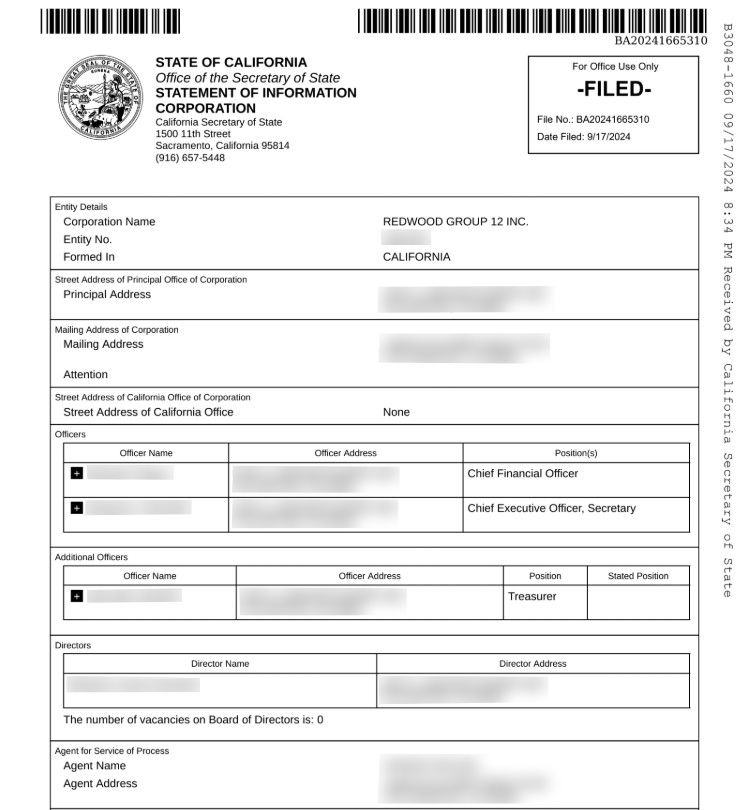
A state business filing for Redwood Group 12, Inc. lists two people as officers of the company. Those names match identification cards used in rental applications for retail spaces used for illegal cannabis dispensaries. Spectrum News spoke to one man whose identity was used, and he said his identity was stolen. (California Secretary of State’s Office)
Kuhn also said landlords can face penalties if they allow an unlicensed dispensary to operate.
“If they have an illegal business, cannabis or otherwise, on their property–it is their obligation to evict those violators,” he said.
For landlords, kicking out an illegal dispensary can be costly and time consuming.
Eviction attorney Avi Sinai, who spent 10 months litigating one of the illegal cannabis shops in our investigation, encouraged landlords to do their own research.
“Google their name, and you can add ‘court’ in the search bar next to it. And if there are any past cases, public cases, they will come up,” he said. “From my experience, any tenant with significant litigation history, with more than two or three cases, is probably going to be problematic.”
The eviction process has taken several months for Pang, who initially bought the property as an investment more than 30 years ago.
He had hoped to keep the strip mall in his family, but said he now feels frustrated by a legal process that feels stacked against him.
“The law [here] is mostly [to] protect the tenant more than [to] protect the landlord,” Pang said.
Search
RECENT PRESS RELEASES
Related Post



